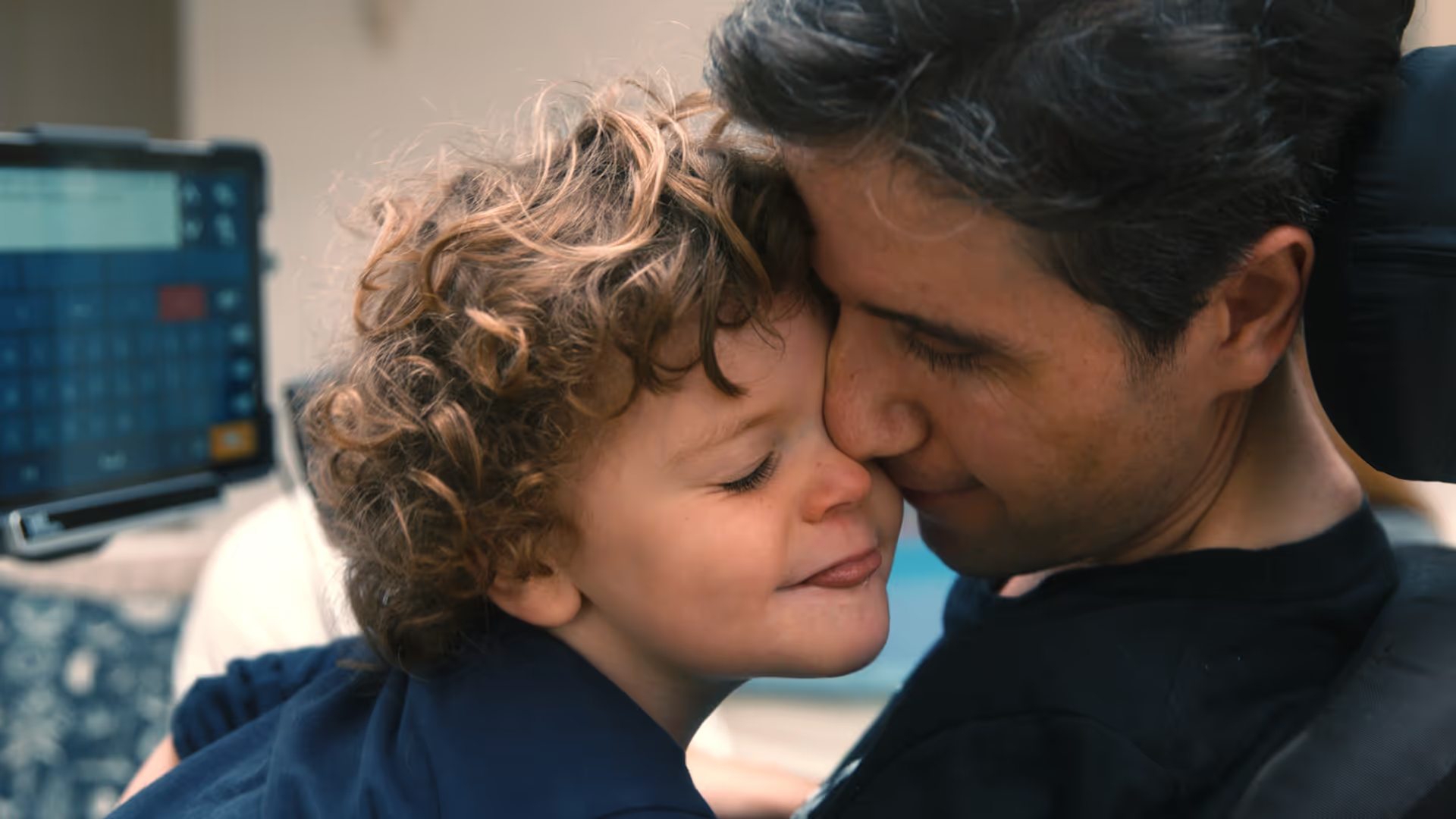Discussion Guide
Grades 6-8
Grades 9-10
Grades 11-12
Not Going Quietly Discussion Guide Discussion Prompts
Discussion Prompts

STARTING THE CONVERSATION
Immediately after the film, you may want to give people a few quiet moments to reflect on what they have seen. You could pose a general question (examples below) and give people some time to themselves to jot down or think about their answers before opening the discussion. Alternatively, you could ask participants to share their thoughts with a partner before starting a group discussion.
- What is your initial reaction to the film? What feelings come up for you? How do you feel in your body watching this film?
- If you could ask Ady one question or say one thing to him, what would it be?
- What in the film surprised you the most? What aspects of the film inspired you the most?
RESPONSIBILITY FOR ALL: LEARNING FROM ADY BARKAN
- What does Ady’s commitment to political change after receiving his diagnosis of a terminal illness teach us about the possibilities for personal experiences to inform political will? Name some reasons it is important for individuals to fight for equality, in a democratic country, when they haven't been personally impacted or harmed by systemic oppression.
- In what ways does this film authentically represent the realities of both struggle and resilience without glorifying either?
- Ady’s diagnosis of ALS comes with a predictable outcome, and viewers are allowed an intimate glimpse into how he and his family negotiate a future that is beyond their control. While political decisions might sometimes feel beyond everyday citizens’ control, in what ways does Ady’s commitment to activism after his diagnosis invite you to think differently about agency, change, and possibility?
- One of Ady’s motivations in allowing the filmmakers such intimate access to his life was to leave something for Carl and Willow. How do the legacies we wish to leave behind for those we are closest to also impact a larger community?
- What lessons does Ady’s commitment to activism, alongside his commitment to being a good parent and husband, offer about the importance of feeling accountable to future generations?
- In what ways are the futures of our own family members and children interconnected with the futures of other families and children?
- In Not Going Quietly there is a balance between footage of Ady at home with his family and Ady on the road. In what ways are love, care, and intimacy reflected in both settings? What did this teach you about possibilities for community and care in politics and activism?
- What does this film teach us about the importance of allowing others to support us?
DISABILITY, ACCESSIBILITY, AND SACRIFICE
- In what ways did Not Going Quietly impact how you think about accessibility, activism, and your own civic engagement?
- What barriers, if any, have kept you from feeling that political and civic engagement are places where you can be an active participant? In what ways does this film make you reconsider how you’ve viewed those barriers or inspire you to approach activism differently?
- What lessons can activists learn from this film with regard to making grassroots communities collectively accessible so that differently-abled people are supported structurally and individually in political participation?
- In what ways are acknowledging and honoring differences crucial components of justice-oriented futures?
- Though the backdrop of the film is Ady’s ALS diagnosis, Not Going Quietly also focuses on Ady as a father, a husband, a friend, and an activist. How does it do so? In what ways does this film invite you to reflect on how people with disabilities are treated in everyday life and represented in media?
- In what ways has this film invited you to think critically with regard to how you are treated as a person with disabilities and/or how you treat differently-abled people in your life and community?
- Though this film centers Ady as an activist for healthcare reform, what are some examples of how community was essential to Ady’s continued involvement in politics? What does this teach us about the crucial need for community, trust, and support in our everyday lives?
- Many people in the film make sacrifices for causes greater than themselves. Who are some subjects who made personal sacrifices for the sake of the public good? What does this film teach us about those behind the scenes and their crucial roles in making possibilities for political change more realizable?
- What are some examples of barriers to accessing healthcare in the U.S.?
- In what ways are these barriers less important than human beings receiving the life-saving care they might require?
- Ady claims that dealing with insurance companies is even worse than knowing he is dying. In what ways does the current healthcare system in the U.S. cause suffering rather than offer support to those who most need it?
GRIEF, LOSS, AND POLITICS
- In what ways might our political commitments to change be impacted if we took seriously our limited time, our mortality, and the legacies we aim to leave behind? What does Ady’s story invite you to consider with regard to the certainty of death?
- Though many consider grief something that happens after death, anticipatory grief is an experience people can have before death or dying. This type of grief emerges in preparation for losing a loved one; or, for those who are dying, in response to loss of independence or abilities. In what ways did you witness grief emerging in this film?
- What, if anything, was compelling or unsettling about the honesty with which death and grief were discussed in this film? Why?
- If death and grief are common experiences, why might we tend to avoid conversations that directly address death and loss? How might our approaches to caring for one another and ourselves be changed, or benefit, from more candid conversations about the ways death and loss have changed us?
- In what ways might loss and grief be made into a resource for political communities?
- In what ways does death impact structural support (i.e., housing, economic security, care, guardianship) for those who experience loss? How is thinking about death and loss a political and structural concern for those who desire equity?
- In what ways might universal healthcare support conditions that would ensure every living person has the opportunity to die with care, support, and dignity?
ADVOCACY LESSONS: SOCIAL MEDIA AND SOCIAL CHANGE
- In what ways did Not Going Quietly highlight the power of everyday people to participate in politics and to document political encounters?
- How did social media function as an important tool in activists’ strategies? What are some ways social media can be leveraged in changing political landscapes to support grassroots movements?
- In what ways does posting political encounters on social media (as we witness in the bird-dogging training scene) impact issues of accessibility?
- In what ways did activists in the film engage in joy and community-building throughout their tireless work? What did this teach you about the importance of joy and community in political organizing?
- A very powerful scene in the film is when Ady steps back so Ana Maria Archila can share her experience as a survivor of sexual assault during the Brett Kavanaugh nomination. In what ways do political events, like the nomination of Kavanaugh, often exclude the stories and experiences of everyday people?
- In what ways does Ady prioritizing Ana Maria’s testimony highlight dynamic intersections of power, privilege, and identity to offer models for activists engaged in different, though interconnected, struggles for justice?
- What are some (potentially new) ways Not Going Quietly expanded your understanding of what activism can look like and/or inspired you to get involved in local or national politics?
CLOSING QUESTION/ACTIVITY
- At the end of your discussion, to help people synthesize what they’ve experienced and move the focus from dialogue to action steps, you may want to choose one of these questions:
- After seeing Ady refuse to be sidelined, what are things that you have allowed to hold you back that you now recognize you can move beyond?
- Relationships are important. We can see the unconditional love between Rachael and Ady and Ady and Nate, as well as the powerful bond between Ady and Liz, and, of course, Ady’s love of Carl and Willow. Think about the people in your life and consider whether you have told them what they mean to you and their importance in doing the work that you do.
- Consider, also, the role of relationships in forming bonds within activist communities and political spaces. What role does trust play in cultivating and sustaining social movements?
